#amlo
Text
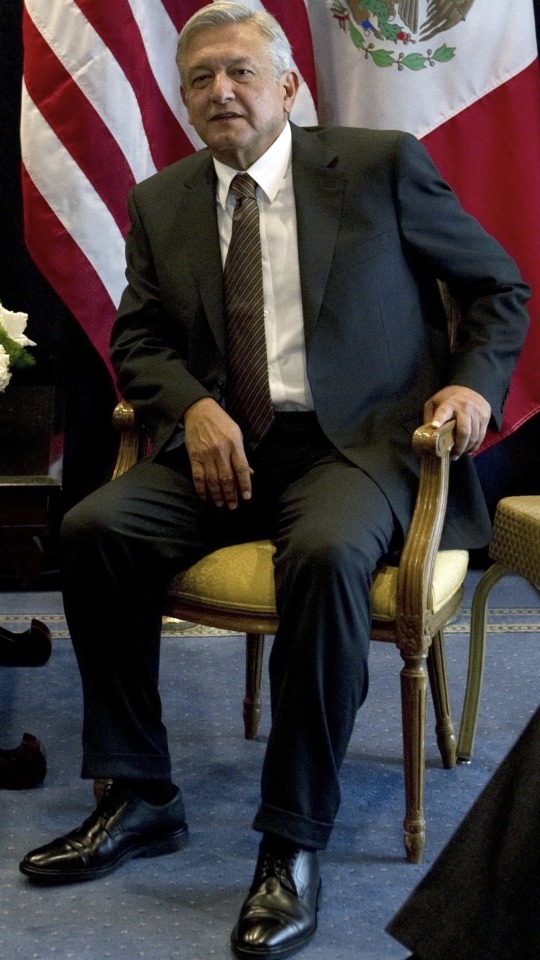
Andrés Manuel López Obrador
#suitdaddy#suiteddaddy#suit and tie#suited daddy#daddy#men in suits#silverfox#suitfetish#suited men#suited grandpa#suitedman#suit daddy#suited man#buisness suit#suitedmen#mexican men#mexican man#AMLO#Andrés Manuel López Obrador
99 notes
·
View notes
Text
A very valid theory on the timeline of Tenoch's "coincidental allegations"
The Tumblr post comes from the anon submission for @cutelatinagirl. I think this is a great theory. We all know how politics works. Also this account is fairly recent to the Tenoch Twitter active scene I noticed, but if you're around just wanted to say, I'm very impressed by your posts.



Link to whole tweet:
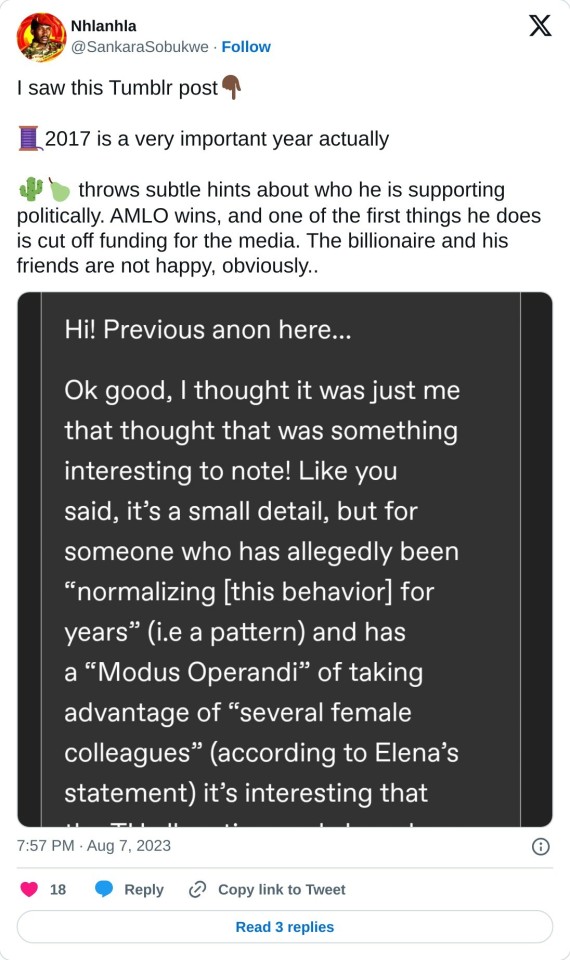
#tenoch huerta#tenoch huerta mejia#jose tenoch huerta mejia#twitter user: sankara sobukwe nhlanhla#amlo
66 notes
·
View notes
Text





Un día con mi novia Luz, aunque diga que no la cuyeya
@cazlz
#mazatlan#cruz azul#la dura vida de un bandido#ahora va la mia#el incomprendido#amor#indirectas#morena#amlo#galerias serdan#novios#Spotify
8 notes
·
View notes
Text
youtube
CONDONACIÓN DE IMPUESTOS EN MÉXICO (antes de AMLO)
grupo TELEVISA 20488 millones de pesos
grupo BANAMEX 15842 millones de pesos
grupo CEMEX 12755 millones de pesos
grupo CARSO 10299 millones de pesos
y etcétera, etcétera, etcétera....
1 Dólar estadounidense = 16.85 Pesos Mexicanos
1 Euro = 18.92 Pesos Mexicanos
ah pero dicen los ricos que los pobres somos pobres porque queremos 😒🙄🤨
35 notes
·
View notes
Text
2nd Influx of Haiti Casus Belli Propaganda : Let's Get Ahead of the Curve
We saw about this time a year or two ago, that the USA was manufacturing a lot of propaganda to manufacture consent for war in Haiti.
Like all good Machiavellian strategists, they have let the first wave of propaganda sit and ferment, allowing some people, some mass conscious pioneers that act as emissaries to the public with the will of the Empire, to familiarize themselves with Haiti’s existence.
Now, a second wave has begun, and with greater reach and intensity. I think we can expect more tangible actions intended than a smattering of Kenyan militia being sent to Haiti–after it is established that the American public and its bleeding heart liberals have expressed approval of a “humanitarian mission.”
Now is the time to educate ourselves, our comrades, and those within our sphere of influence as individuals and as a group about Haiti, its long past of brutal invasion consisting of mass murder, rape, and looting by the USA, the UN, and European powers, the actual situation of the “gang problems” cited by the USA as justification for military action, and the Haitian leadership.
The white supremacist empire has never forgiven Haiti for freeing itself by the blood of slave masters, and they have spent a century punishing them for their bravery, audacity, and dignity.
This is the exact blueprint for “cartel violence” the the USA is creating and then citing to build casus belli against Mexico.
If we can get ahead of the wave, it will save us a lot of headache in fighting the psychological war for American hearts and minds, not just for Haiti, but for Mexico, and all the other last-ditch-effort blundering invasions the dying empire will lash out with in the final act of its existence.
HANDS OFF HAITI!
#hands off haiti#free haiti#haiti crisis#haitian#little haiti#haiti#gang violence#humanitarian crisis#humanitarian aid#mexico#amlo#amlovers#free plaestine#palestine#free gaza#marxism leninism#colonialism#imperialism#socialism#propaganda
16 notes
·
View notes
Text
Watch "'Mexico is not a US colony!': AMLO condemns invasion threats, honors nationalization of oil, lithium" on YouTube
youtube
I've got to admit, AMLO has surprised me with his persistence and determination to wield the tools of the Capitalist State of Mexico in the service of the Working Class.
Meanwhile, US Congressman Republican Dan Crenshaw has proposed a Bill to invade Mexico in order to stamp out Mexican Drug Cartels using the AUMF passed just after 9/11 to go after the "perpetrators" of 9/11. Now it would be used to invade Mexico if Dan Crenshaw has his way.
Other Republicans have been making similar threats, including MTG, Lindsay Graham and the usual suspects.
As US society, culture and the economy begin to implode, the regime becomes ever more dangerous to the people of the world.
#AMLO#amlo speech#socialist news#socialist politics#socialism#communism#marxism leninism#socialist#communist#marxism#marxist leninist#progressive politics#politics#Youtube
61 notes
·
View notes
Video
youtube
#NarcoChayoteDeLaDEA🇬🇧@Foro_TV🇮🇱@JorgeGCastaneda🇺🇸@literalmexico @WSJEX #NarcoPresidenteFECAL @FELIPECALDERON #GARCIALUNA @XochitlGalvez @NYTimesPR @nytimes @aguilarcamin @CarlosLoret🙏#TodosSomosLoret @CiroGomezL🚨↔️@JJDiazMachucahttps://guerracivil2024.blogspot.com/2024/02/httpswww.htmlhttps://pic.twitter.com/Ixl6ofutSe
https://twitter.com/RedesRZK/status/1762696936451150315
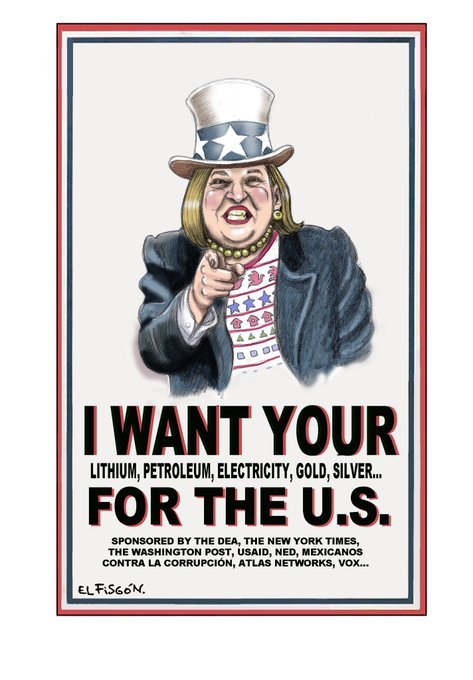
@Claudiashein #ClaudiaPresidenta2024https://t.co/Ixl6ofutSe#NarcoChayoteDeLaDEA🇬🇧🇮🇱🇺🇸@WSJ
EX #NarcoPresidenteFECAL @FELIPECALDERON #GARCIALUNA @XochitlGalvez @NYTimesPR @nytimes @aguilarcamin @CiroGomezL @JJDiazMachuca @El__Balsero @ferbelaunzaran @CarlosLoret #TodosSomosLoret pic.twitter.com/dKoJnDb5an
— redesrzk (@RedesRZK) February 28, 2024
Tweets by RedesRZK
#amlo#quesadillladeverdades#mexico#NarcoChayoteDeLaDEA🇬🇧@Foro_TV🇮🇱@JorgeGCastaneda🇺🇸@literalmexico @WSJEX NarcoPresidenteFECAL @FELIPECALDERON GARCIALUNA @XochitlGalvez
10 notes
·
View notes
Text

Mexico. AMLO and next Mexican President Claudia Sheinbaum.
11 notes
·
View notes
Text
"The political and moral authority of the President is above that law."
Biden-haters and Trump-haters alike, take note. This is what abuse of power actually looks like.
7 notes
·
View notes
Text
Is AMLO a leftist?
The US media portrays López Obrador as a leftist president. He is not.
The “american” news outlets continue to make the same mistake made by the Mexican and Latinamerican media (specially, Argentinian): they take AMLO’s rethoric as if it were true or the whole reality. But his discourse -permanent electoral rethoric- is not his decisional reality. Economically, this reality is not a leftist one; it is nothing but
neoliberalism + clientelism (+ rethoric).
AMLO is not a leftist politician/president. Under his government, the richest got richer, private banks got record profits, tax structure didn’t change (neoliberal in origin and aim), therefore the rich didn’t pay higher taxes, poverty is not actually lower in any relevant sense, Inequality is enormous. I could go on… And AMLO is also an authoritarian. Hence, he is a fraud. A fraud not understood by the media.
5 notes
·
View notes
Text

Andrés Manuel López Obrador
#suitdaddy#suiteddaddy#suit and tie#suited daddy#daddy#men in suits#silverfox#suitfetish#suited men#suited grandpa#suitedman#suit daddy#suited man#buisness suit#suitedmen#suit bulge#mexican men#Mexican man#Andrés Manuel López Obrador#AMLO
62 notes
·
View notes
Text
Recently the mexican president did a 60 minutes interview denying that fentanyl is produced in mexico, then said that fentanyl was produc in united states, canada and mexico
Can't wait for his presidency to be over
4 notes
·
View notes
Text
Un británico bn colapsado en twitter: si muriera tu figura gubernamental no estarías haciendo chistes
Yo si muriera mi figura gubernamental:

#fotitospacurartudepresion#meme#reina isabel ii#amlo#andres manuel lopez obrador#presidente#mexico#bob esponja#spongebob#twitter
128 notes
·
View notes
Photo
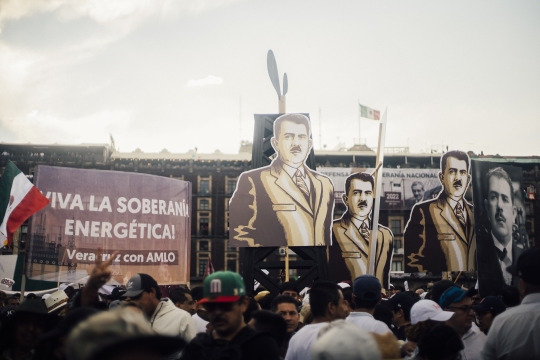
Message from the President of Mexico, Andrés Manuel López Obrador on the 85th anniversary of the expropriation of the country’s oil industry.
Rally held on Saturday, March 18, in Mexico City’s Zócalo square.
PRESIDENT ANDRÉS MANUEL LÓPEZ OBRADOR: Friends:
This is a commemoration of the expropriation of the oil industry and it is a national event. Participating here today are residents of Aguascalientes, Baja California, Baja California Sur, Campeche, Chiapas, Chihuahua, Mexico City, Coahuila, Colima, Durango, State of Mexico, Guanajuato, Guerrero, Hidalgo, Jalisco, Jalisco, Chiapas, Chiapas, Chiapas, Chihuahua, Mexico City, Coahuila, Colima, Durango, State of Mexico, Guanajuato, Guerrero, Hidalgo, Jalisco, Michoacán, Morelos, Nayarit, Nuevo León, Oaxaca, Puebla, Querétaro, Quintana Roo, San Luis Potosí, Sinaloa, Sonora, Tabasco, Tamaulipas, Tlaxcala, Veracruz, Yucatán, and Zacatecas.
Long live Mexico!
Friends:
Unlike Francisco I. Madero, who, in order to realize his beautiful democratic ideal could not or did not consider it indispensable to strengthen his ties with the people, especially with the Zapatista peasants, General Lázaro Cárdenas did not hesitate to rely on those from below to make his transformation a reality.
The general's strategy can be summarized in three important and consecutive actions:
First, he distributed land to the peasant farmers and helped the workers.
Then, he helped them organize.
And, finally, with this social base he was able to carry out the expropriation of the oil industry and other national assets that Porfirio Díaz had handed over to private interests, mainly foreigners.
The top priority of the Cardenista strategy was to attend to the economic and social demands of peasant farmers and workers. The president knew that the only way to gain the backing of the people was to act decisively in favor of their demands. Consequently, from the beginning of his government, a program of land distribution was launched; the peasant farmers mobilized throughout the country requesting that they be given land through the expropriation of large estates or providing them with deeds for state land.
In a short time, the distribution of land to peasant farmers transformed the structure of Mexican agriculture. The revolutionary importance of the Cardenista land distribution policies can be measured with a key piece of data. In the first three years of his administration, 9,764,000 hectares were given to 565,216 peasants, which vastly surpassed the amount of land that had been distributed since the Revolution.
By the end of Cardenas’ administration, 10,651 ejidos (1) had been established, comprising a total of more than 18 million hectares and benefiting more than one million indigenous families, impoverished peasant farmers, and rural day laborers.
The peasants unquestionably saw Cárdenas to be a faithful representative of the revolutionary cause. The agrarian reform ensured the loyalty of many people to the Cardenista government and from that point the alliance between peasant farmers and the State was established.
At the same time, during the Cárdenas years, workers felt that their labor rights were guaranteed. With strict adherence to the law, Cárdenas respected the economic struggle of workers for better wages and working conditions. His measures in this field consisted of making the formal content of Constitutional Article 123 (2) a reality.
From the beginning of his government, the labor movement began engaging in intense activity aimed at winning its demands; it was even able to freely exercise the right to strike.
By the middle of the president’s six-year term in office, peasant farmers and workers identified Cárdenas as the defender of their interests. The first part of Cardenas' strategy had been successful; the President's approach and solidarity with the most vulnerable social groups resulted in the support and adhesion of the majority to the government's policies.
The political organization of workers and peasant farmers as a second link in the Cardenista strategy also developed with intensity and enthusiasm.
First, most of the national industrial unions were established. The Mexican Workers’ Confederation, the CTM, was founded on February 24, 1936. Although the organization's declaration of principles stated, and I quote, that 'the Mexican proletariat will fundamentally fight for the total abolition of the capitalist system,' its leaders accepted the president's proposal and agreed on the need to first achieve the country’s political and economic liberation. In accordance with these principles, the workers' movement resolutely supported the government in its struggle for national sovereignty.
On July 9, 1935, President Cárdenas recommended that the organization of Mexico's peasant farmers take place. With this in mind, the agrarian community leagues were created in all states of the country and their integration with the unions of rural wage earners resulted in the establishment of the National Peasant Confederation, the CNC.
The organization and political mobilization of the masses made it possible to advance in the aim of asserting our country’s economic independence, and thus with the expropriation of the oil companies, national assets and resources that had been in the hands of foreigners since the Porfiriato (3) began to be returned to the nation.
This strategy could not have succeeded without the exceptional qualities of a noble and just man such as General Lázaro Cárdenas del Río.
Politics is not only rationality, but also, like other activities in life, requires mystique and convictions. Political processes are more complex than what rationalist intellectuals assume; political processes also involve factors such as luck, the brilliance of leaders and the sentiments of the people.
General Cárdenas, unlike careerist or elite politicians, professed a sincere and deep love for the people. Just as there is no one with the democratic aspiration of Madero, neither has there ever existed in Mexico a president as close to the downtrodden or as convinced of the cause of social justice as General Cárdenas.
For example, in 1935, when he was already president, already in power, Cárdenas wrote the following in his notes:
'To put an end to the miseries experienced by the people is above all other interests'.
And he maintained: 'Living amid the needs and anguish of the people, one will easily find the way to remedy them'.
Although he also confessed that he had been able to see the true moral background of many public servants. 'When I observe in their faces the disgust sparked by the poor peoples’ demand for assistance or justice, then I think more,' he lamented, 'of the endless tragedy of our own people.’
For young people who want to devote themselves to the noble profession of politics, what is most important is love for the people.
In addition to being a true humanist and possessing other virtues, General Cárdenas knew how to navigate his times with precision. Politics, among other things, is time management, a question that is usually essential and defining.
A few days before announcing the expropriation of the oil industry, he wrote in his notes that, on the highway near Cuernavaca, he’d walked and talked for more than an hour with his teacher, friend and compañero, General Francisco J. Múgica. I’d like to quote General Cárdenas when he says:
'We considered the circumstances that could arise if governments such as those of England and the United States, interested in backing the oil companies, pressured the Mexican government with violent measures. But we also took into account that the threat of a new world war is already present due to the provocations of Nazi-fascist imperialism, and that this would stop them from attacking Mexico in the event that the expropriation was decreed.'
Among other reasons, and taking advantage of this circumstance, on March 18, 1938, the oil industry expropriation was launched. At eight o'clock in the evening, General Cárdenas informed his cabinet of this historic decision and, two hours later, in a radio address to the nation he announced the step taken by the government in defense of Mexico’s sovereignty, returning to the nation the oil wealth that, as the General himself wrote, 'imperialist capital had been utilizing to keep the country humiliated.'
In four articles, the expropriation decree establishes that the following assets would become assets of the nation: machinery, installations and other fixtures and property of the foreign oil companies, for which compensation would be paid in accordance with Article 27 of the Constitution and the corresponding law.
The oil expropriation was supported by the majority of the people. Photos of the time show the presence of predominantly humble people, indigenous men and women, peasant farmers, workers, teachers, employees, and members of the lower middle class.
It was the common people who supported and cooperated with the government to raise the compensation due to the foreign oil companies. How could we forget that so many poor women donated goats and turkeys for this purpose and even got rid of the meager jewelry they owned!
In those days, from the city of Oakland, California, migrant worker Cástulo Prado composed the lyrics and music of the Corrido del Petróleo and sent it to the president with the instruction that the government allocate any royalties from the work to the compensation fund. One of its verses reads as follows:
'Lázaro Cárdenas says, serene and carefree: in the course of 10 years, everything will be paid, I have the Mexican people of which I have no doubt. From the youngest to the oldest, they all offer me their help. In the Mexican woman there is patriotism and pride, she gives up her jewelry to offer them for coins.'
In addition to this massive and overwhelming popular support, the Cárdenas government had another favorable circumstance. At that time Franklin Delano Roosevelt, a great statesman and one of the finest presidents that country has ever had in its history, was governing the United States. Let’s recall that when Roosevelt entered the White House on March 4, 1933, the United States was experiencing one of the worst crises in its history and that, as president, Roosevelt knew how to deal with that crisis successfully and very soon restored hope to his people, which made him one of the greatest politicians of the 20th century.
As for his foreign policy, let’s recall that, in a memorable speech, which is the antecedent of the principles of the UN, on January 6, 1941, Roosevelt laid out four basic freedoms for the world: the right to freedom of speech, the right to freedom of worship, the right to live free from want, and the right to live free from fear.
Roosevelt's presidency applied the ‘good neighbor policy’ with the countries of the Western Hemisphere. At that moment, the principles of economic and political cooperation were defined, the sovereignty of Cuba and Panama was recognized, and the U.S. military withdrawal from Nicaragua and Haiti was ordered. It is not by chance that the great poet Pablo Neruda called Roosevelt a titan of the struggles for freedoms, a tremendous president.
The authenticity of his good neighbor policy was most clearly demonstrated in the respect for the sovereignty of our country. During Roosevelt's three presidential terms, relations between Mexico and the United States were exceptionally good.
In the days following the oil industry expropriation, General Cárdenas acknowledged Roosevelt’s role in a letter:
'My government’ -wrote the general- ‘feels that the attitude assumed by the United States of America, in the case of the expropriation of the oil companies, once again affirms the sovereignty of the peoples of this hemisphere that the statesman of the most powerful country in the Americas, the most esteemed President Roosevelt, has been supporting with such effort'.
Cástulo Prado, the poet we have already quoted, a people’s poet, also left testimony of the upright attitude, the grandeur, and the respect shown by the president of the neighboring country. Cástulo's verses read:
'The millionaires asked for intervention. They went to the United States to lodge their complaint -it looks to us, it looks to us, it looks to us- they went to the United States to lodge their complaint so that from there they would move to protect their companies. Roosevelt told them: 'Gentlemen, I can do nothing about it, the Mexican government has fulfilled its duty.'
The good results of this policy had much to do with the U.S. Ambassador to Mexico, Joseph Daniels, who acted with wisdom and skill in the most difficult years of relations between the two countries. His position on the oil conflict is summarized when he maintained that President Cárdenas was right in promoting the policy that the wealth of the subsoil should become part of the Mexican economy and that the oil crisis was due to the systematic refusal of foreign companies to modify their vision, since, Daniels pointed out, they felt that Mexicans were born to enrich foreigners and that God placed important natural resources in Mexico to increase the fortunes found in the coffers of the exploiters and concession holders.
But the companies were not as conscientious and respectful as U.S. politicians. The nationalization process had to confront the boycott, pressures, and acts of sabotage promoted and financed by the foreign oil companies.
In Mexico, the oil industry expropriation caused deep uneasiness among a minority, especially among the wealthy of the time, in middle-class sectors, and in most of the media.
It is interesting, and this is a lesson, to point out that historically the right wing always regroups when a democratic change is sought and becomes intolerant and even violent when it comes to social demands in favor of the people and the nation asserting its control.
Let us remember that the overthrow of President Madero, our Apostle of Democracy, was backed by the intervention of the U.S. Ambassador, but was carried out by domestic right-wing groups which had previously promoted a campaign of hate and discredit consisting of ridiculing the President, President Madero, in the newspapers to the point of treating him as a madman and a spiritualist.
The same thing happened when the expropriation, although it did not directly affect national private interests, served to bring together all the discontent of conservative groups opposed to the agrarian, labor, and educational policies of General Cárdenas.
In this climate, on September 17, 1939, the National Action Party was founded. It was founded as a reaction to the oil industry expropriation. I say this here in the Zócalo because I am not lying, I am speaking the truth.
In 1940, all these reactionary trends manifested themselves very strongly in the presidential election. The right-wing opposition was such that General Cárdenas had to act cautiously, and possibly that influenced him to support the candidacy of Manuel Ávila Camacho and not that of General Francisco J. Múgica, with whom he had more ideological affinity and who represented a greater certainty of continuity and deepening of the social and nationalist policy.
It has always been said that the general did not choose Múgica because of the risk of foreign intervention. However, as we have seen, at that time Roosevelt, who had demonstrated his respect for national sovereignty, was governing and World War II was about to break out, a situation that contributed to dissipating the threat of a U.S. intervention.
In my opinion, what most influenced the decision was the internal political circumstances, that is, the belligerence of the right-wing groups. Remember that, even though he’d decided in favor of the candidacy of Manuel Avila Camacho, who held moderate positions, the presidential election was complicated and violent.
The opposition candidate, Juan Andreu Almazán, had the support of important right-wing groups and a sector of the Army. Even the PAN, which did not run a candidate for the presidency, openly supported him.
At the end of the day, 30 dead and 127 wounded were reported. However, shortly after, Almazán gave in and his supporters, businessmen and right-wing politicians came to an understanding and made a pact for concessions and benefits with the new Ávila Camacho administration.
From then on, the authentic revolutionary ideal and actions for the benefit of the people began to be abandoned, although it must be acknowledged that this alliance between political and economic power perhaps avoided civil war and maintained social peace.
If under Porfirio Díaz, the peace of the graveyard prevailed, after President Cárdenas’ government, the peace of compromises and corruption was established.
In this brief history there are major lessons, the main one being that only with the people, only with the support of the majority, can a popular transformation be carried out to enforce justice and confront the reactionaries who oppose the loss of privileges.
For this reason, today we once again declare, we exclaim from the rooftops: no zigzagging, let us remain anchored in our principles, let us reaffirm the decision and the course we have taken since the administration began. No half measures: we in Mexico will never allow a minority to impose itself at the expense of the humiliation and impoverishment of the majority.
That is why, in our government, corruption is being fought. There is an austere government, without luxuries, and all the savings are used to finance well-being programs, such as pensions for the elderly, support for people with disabilities, single mothers, peasant farmers and fishermen, scholarships for students from poor families, Internet for All, housing improvement and construction programs, collateral-free loans, fertilizer, and guaranteed prices for the country's small producers, the Bank of Well-Being, the promotion of education and universal and free public health care.
This year more than 25 million people will receive direct support totaling 600 billion pesos (4). In other words, out of 35 million households in the country, 71 percent will receive the benefits of at least one of the social programs.
With this policy of attention to the neediest, the most vulnerable, and especially to young people, we have also been able to reduce federal crimes by 33 percent, homicides by 10 percent, vehicle theft by 38 percent, general robberies by 20 percent, huachicol (5) by 92 percent, femicides by 28 percent, and kidnappings by 76 percent.
By the same token, the savings from not allowing corruption or budgetary waste have enabled us to avoid contracting more debt. We have not requested additional debt since we have been in office.
And at the same time, without increasing the public debt in real terms, taxes have not been increased, the price of gasoline, diesel, gas, and electricity have not risen. There has even been a decrease in the price of these energy resources.
There has also been an increase in public investment, as has not occurred in many years. This year we will spend more than one trillion pesos (6) on public work projects. That is, we will continue building highways, bridges, trains, airports, hospitals, universities, markets, sports facilities, seawalls, and natural, recreational, and ecological parks.
And we are carrying out something very important: an extensive project to recover and restore historical and archeological sites of our ancient and splendid cultures and civilizations.
Public finances are strong, the national economy is booming. Last year the Mexican economy grew even more than the economies of China and the United States.
There are an unprecedented 21,747,000 workers enrolled in the health system. This figure of 21,747,000 workers in the formal economy has never been reached before.
In addition, an average wage of 525 pesos (7) per day has been achieved for these workers in the formal economy, something that had never occurred before.
The unemployment rate last January was 2.9 percent, the lowest since 2005.
We are carrying out public work projects. Right here we are refurbishing the Metro line that collapsed.
We are, of course, building the Toluca-Mexico City train line, the Maya Train, the Transisthmic Train and many, many other public works projects.
What is happening?
After many years, we managed to get the United States to offer temporary work visas. Canada was already doing this and the United States did not accept it. Now with President Biden’s change of policy it was achieved, but they are taking skilled workers, ironworkers, welders, who are needed here for the works projects. We are going to make a small modification, because Mexico comes first and then foreign countries, but this shows how much demand there is for jobs in the country.
During the time we have been in office, the minimum wage has increased by 90 percent in real terms, and on the border it has more than doubled.
Do you remember what the lying technocrats used to say? That if wages were increased, there would be inflation. That's all a bunch of nonsense. That is not true. Of course, we have to improve wages responsibly, to strengthen the domestic market, as we are doing, and thus achieve well-being for our people.
The stock market, corporate and bank profits are posting good numbers.
The Banco de México’s reserves have increased by 15 percent, 200 billion dollars in bank reserves.
Foreign investment has climbed to previously unseen figures.
This has also occurred with remittances from our migrant countrymen and women. Thank you very much, fellow countrymen and women. Last year these remittances practically reached 60 billion dollars; this year they are going to exceed 60 billion dollars.
This is very important, because this money gets to the most remote communities, to 10 million families who benefit from them, and with this money the regional economy, commerce and other economic activities are reactivated.
It is also important to emphasize that the peso is the currency that has most appreciated in the world in relation to the dollar, something that has not occurred for more than 50 years.
We have also directed our resources and efforts to achieve food self-sufficiency and energy self-sufficiency. In the latter, as reported here by the Ministry of Energy and the Director of Pemex, we can be certain that oil sovereignty is being guaranteed. Next year we will not be buying gasoline, diesel or other oil products abroad; we will be processing all of our raw materials.
The Federal Electricity Commission, the public company in charge of managing the electricity industry, has been strengthened.
And recently lithium, a strategic mineral used in manufacturing batteries for electric cars and storage systems for clean energy, was nationalized.
It fills me with pride to be able to recall -I apologize for taking so long, but I am about to finish- it fills me with pride to be able to recall today, March 18, that, despite the policy of granting concessions that prevailed before we came into office, we were able to remove a long chapter from the Free Trade Agreement that compromised our oil and put in its place a small paragraph, which I am going to read to you.
It says: 'The United States and Canada recognize that Mexico reserves its sovereign right to reform its Constitution and domestic legislation, and Mexico has the direct, inalienable, and imprescriptible ownership of all hydrocarbons in the subsoil of the national territory.'
My friends:
I am convinced that we will continue to receive the support of the people to consolidate the first stage in the transformation of our country.
I am also convinced that whichever candidate wins the poll to become the candidate of our movement will apply the same policy in favor of the people and in favor of the nation.
Continuity with change is assured. There is nothing to fear. Of course, we have to remain united, always looking towards the future and the happiness of our fellow men and women. This means working from below and with the people, and without neglecting the strategy that we rightly call the revolution of consciences to keep advancing in the change of mentality so as to continue politicizing our people and thus have an increasingly aware population. In this we have made considerable progress, as Mexico is one of the countries with the least political illiteracy in the world.
With that awareness we will continue, with that collective consciousness we will continue to counteract the dirty war, the slander campaigns and the attempts at manipulation that will continue to be waged, because our adversaries and their media, sold out, rented or in the hands of the members of the conservative and corrupt block, have no other choice. But at the same time we must have faith in the wisdom and loyalty of the people, the people do not betray.
Let’s recall that the victory of the reactionaries, as Juarez said, is morally impossible. We are finding that the idea and practice of exalting Mexican humanism is electrifying and is reaching the consciousness of millions of people. I base my optimism on this.
And even though it is more dangerous to underestimate the strength of one’s adversaries than to overestimate it in politics, I maintain that no matter what they do, the oligarchs will not return to power; an authentic and true democracy will continue to prevail in our beloved Mexico.
Friends:
I cannot fail to mention that in the past few days some U.S. legislators, accustomed to seeing the mote in their brother's eye, but not seeing the beam in their own, in a propaganda ploy -we would say here in colloquial language grilla or intrigue- and for electoral, politicking purposes, argued that, if we did not stop the trafficking of fentanyl to the northern border, that they were going to propose to the Congress of their country that U.S. soldiers occupy our territory to confront organized crime.
First, I want to make it clear that this is no longer the time of Calderón or García Luna, that this is no longer the time of shady links between the Mexican government and U.S. government agencies. Now there is no simulation, organized and white-collar crime is truly being fought, because there is no corruption, no impunity, and there are no complicit relationships with anyone.
But what is most important is that from here, from this Zócalo square, the political and cultural heart of Mexico, we remind those hypocritical and irresponsible politicians that Mexico is an independent and free country, not a colony or a protectorate of the United States, and that they can threaten to perpetrate any offense, but we will never, ever allow them to violate our sovereignty and trample on the dignity of our homeland.
Cooperation yes, submission no; interventionism no.
PRESIDENT ANDRÉS MANUEL LÓPEZ OBRADOR: Oligarchy!
Crowd response: No!
PRESIDENT ANDRÉS MANUEL LÓPEZ OBRADOR: Corruption!
Crowd response: No!
PRESIDENT ANDRÉS MANUEL LÓPEZ OBRADOR: Racism!
Crowd response: No!
PRESIDENT ANDRÉS MANUEL LÓPEZ OBRADOR: Freedom!
Crowd response: Yes!
PRESIDENT ANDRÉS MANUEL LÓPEZ OBRADOR: Democracy!
Crowd response: Yes!
PRESIDENT ANDRÉS MANUEL LÓPEZ OBRADOR: Honesty!
Crowd response: Yes!
PRESIDENT ANDRÉS MANUEL LÓPEZ OBRADOR: Social justice!
Crowd response: Yes!
PRESIDENT ANDRÉS MANUEL LÓPEZ OBRADOR: Equality!
Crowd response: Yes!
PRESIDENT ANDRÉS MANUEL LÓPEZ OBRADOR: Sovereignty!
Crowd response: Yes!
PRESIDENT ANDRÉS MANUEL LÓPEZ OBRADOR: Long live the expropriation of the oil industry!
Crowd response: Viva!
PRESIDENT ANDRÉS MANUEL LÓPEZ OBRADOR: Long live the workers and technicians of the national oil industry of yesterday and today!
Crowd response: Viva!
PRESIDENT ANDRÉS MANUEL LÓPEZ OBRADOR: Long live General Lázaro Cárdenas del Río!
Crowd response: Viva!
PRESIDENT ANDRÉS MANUEL LÓPEZ OBRADOR: Viva Mexico!
Crowd response: Viva!
PRESIDENT ANDRÉS MANUEL LÓPEZ OBRADOR: Viva México!
Crowd response: Viva!
PRESIDENT ANDRÉS MANUEL LÓPEZ OBRADOR: Viva México!
Crowd response: Viva!
Translator’s Notes:
1) Ejidos – semi-communal farmland
2) Constitutional Article 123 enshrines labor rights
3) Porfiriato - The period of Porfirio Díaz's presidency of Mexico (1876–80; 1884–1911), an era of dictatorial rule
4) US$31.89 billion
5) Huachicol – the massive theft of fuel from pipelines and refineries
6) US$53.16 billion
7) US$27.91
Translated by Pedro Gellert
México City, March 18, 2023
25 notes
·
View notes
Text
On Trans Day of Visibility, the Mexico City government teargassed a crowd of trans protestors that included one federal deputy, even though she's in the ruling party herself. AMLO is homophobic, transphobic trash
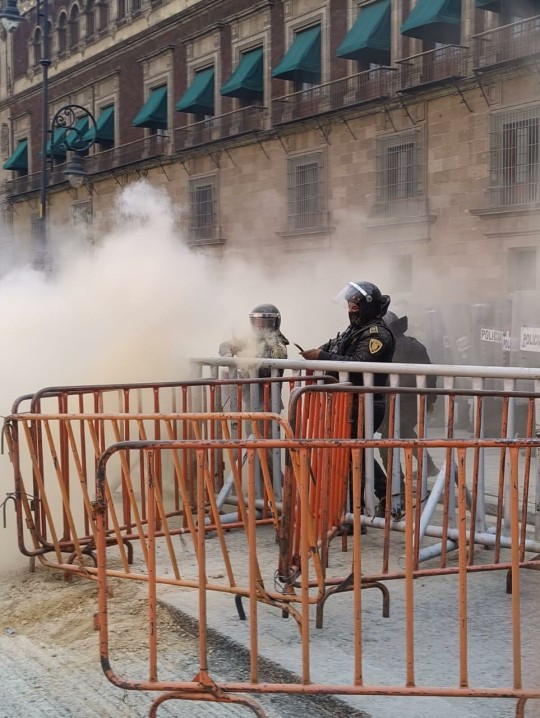
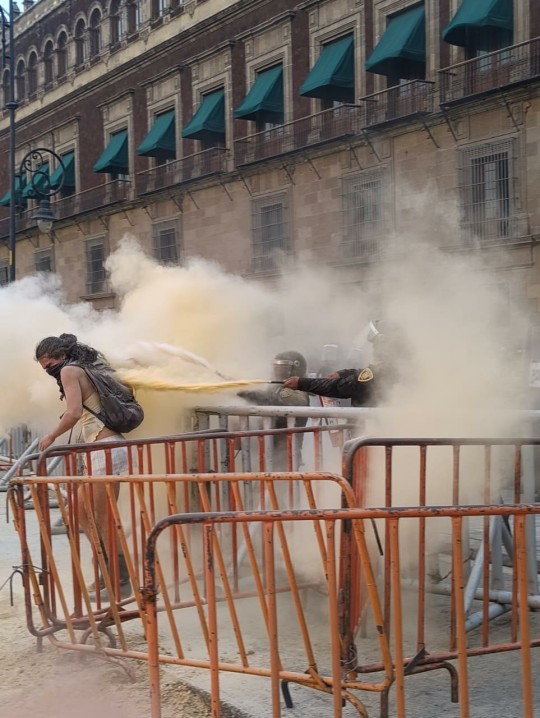


#trans day of visibility#mexico city#trans#protest#federaldeputy#amlo#homophobia#transphobes#marcha#nb#transgender#trans solidarity#transisbeautiful#class war#lgbtqia#lgbtqia+#lgbtqia+ solidarity#anti transphobes#antifa#antifascist#antifaschistische aktion#anarchism#ausgov#politas#auspol#tasgov#taspol#australia#fuck neoliberals#neoliberal capitalism
5 notes
·
View notes